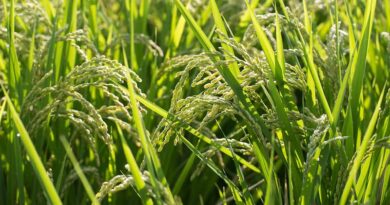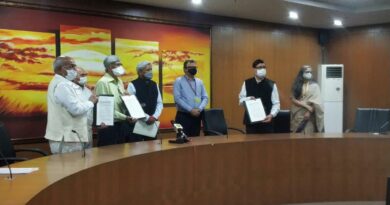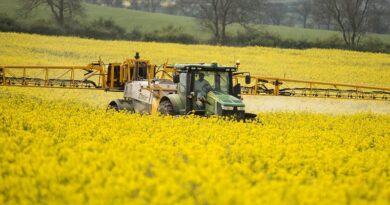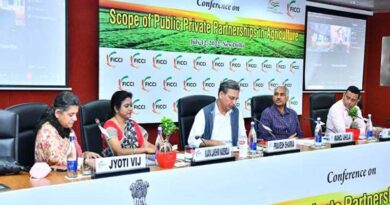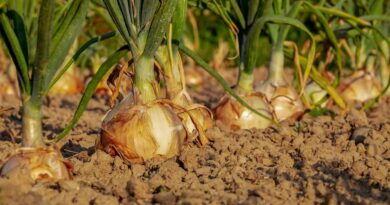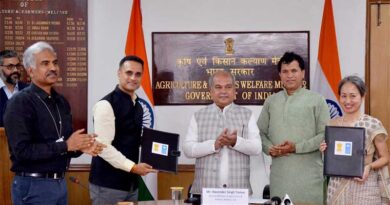Govt to soon launch one stop shop on Agri data: Dr Ashish Kumar Bhutani CEO PMFBY
Market size of AI in agriculture expected to reach $ 8.4 billion by 2030 from $ 0.85 billion in 2019: FICCI-PwC Report
08 October 2020, New Delhi, IN: Dr Ashish Kumar Bhutani, CEO, PMFBY and Joint Secretary (Credit), Ministry of Agriculture and Farmers Welfare, Govt of India today said that the government is putting up a common data infrastructure of all the farmers in the country.
Also Read: Wheat experts of PAU issue advisory for farmers
“PMFBY, PM-Kisan, the Soil health Card, are all being integrated through a common database along with land record details over the period of time. This will act as a one stop shop for data, including access to finance by farmers, start-ups, and researchers for developing new apps, so that the benefits reach the grassroots,” he added.
Addressing a webinar on AI & Digital Applications in Agriculture, organized by FICCI, jointly with theGerman Agribusiness Alliance, Dr Bhutani said that the data will be reliable, and that the government is targeting to launch this soon. “The government acting as an enabler is a critical factor in faster adoption of AI,” he said.
Dr Bhutani further stated that developing standards for sharing and improving the quality of data will be monitored closely by the government. “The government is working to provide an enabling environment where the private players and government can work together to bring the benefit of AI to all the farmers and the consumers. This will also help in bringing down the price for the consumers as well as getting the best price for the farmers,” he emphasized.
Dr Bhutani added that India has about 145 million farmlands with very small holding size, which is around one hectare per holder. The target of doubling farmers’ income is a massive task to be achieved. “Artificial Intelligence would play a major role in ensuring that targets are met. There is a need for digitalization in the agriculture sector,” he added.
Elaborating on the PMFBY (Pradhan Mantri Fasal Bima Yojna), he said that since its launch, the scheme has been a radical shift in the way crop insurance is implemented in the country. It is the third biggest program in the world after the US and China’s programs. “Technology is the way forward for implementation of the program.
While highlighting the initiatives of the government, Dr Bhutani said that the biggest challenge is to increase the production by 50 percent over the next 20-30 years with limited scope of increase in the farming area. “The entire focus has shifted to using technology for managing the food security and other aspects of agriculture. AI can be effectively used in soil monitoring, predictive data analytics and improving supply chain inefficiencies. The National e-Governance project on agriculture, which has been revisited this year, has given focus on using information technology, AI, Machine Learning etc.,” he noted.
Also Read: Haryana opens paddy procurement registrations for outside farmers
He further stated that the use of AI and digital technologies for smart crop cutting experiments will further improve the accuracy of forecasts and lead to effective implementation of the PMFBY.
Mr Gagandeep Singh Bedi, Agriculture Production Commissioner & Principal Secretary, Govt of Tamil Nadu said that the state was one of the first in the country to adopt AI and implement it in farmer welfare programs. “The impact and utility of Digitization and AI are perhaps, more beneficial in the agriculture sector than any other sector. The young farmers are taking to digitization in a big way,” he added.
Highlighting the state government’s initiative to support the farmers, he said that the ‘Uzhavan’ app provides all necessary information using AI and digital technology. The government regularly sends updates to farmers on irrigation, weather forecast, apart from providing a platform for them to trade as well. He also highlighted that the state government is increasing the use of latest technology for drip irrigation in the state.
Prof Dr Engel Friederike Hessel, Commissioner for Digitization, Head of Directorate Digital Innovation, Federal Ministry of Food & Agriculture, Germany highlighted various initiatives adopted by the country using AI, which has brought a radical change in the agriculture sector. She said that digital technologies in the agricultural sector includes a high-performance and secure broadband infrastructure which is vital for rural areas. “We have already started put in place the autonomous driving mechanism in our system and AI can further help in resource efficiency,” she added.
Mr Rajesh Raghavan, MD & Country Manager-India, Husqvarna India Pvt Ltd said that Artificial Intelligence is a game changer to the agrarian community and can play pivotal role in both the demand and supply aspects of agriculture. AI and allied digital applications can contribute to a sustainable precision farming from crop selection to crop monitoring, thereby improving the profitability of the farming community, he added.
Mr Nitesh Bansal, SVP & Global Head of Engineering Services, Infosys said that advanced technologies such as IoT, Blockchain, AI & Robotics help agri-businesses gain insights on soil, water, weather and other conditions to help growers monitor crop health, reduce harvest losses and maximize yield. “Infosys’ AI powered Smart farming solutions helps deliver meaningful insights, enable sustainable agricultural practices, design and develop next-gen farm equipment and build personalized services. We aim to leverage technology to improve overall productivity, traceability and compliance across the food value chain,” he added.
Mr TR Kesavan, Chairman, FICCI National Agriculture Committee & Group President, TAFE Ltd said that AI and digital technologies can connect farmers and markets thereby reducing on-farm and post-harvest wastages and ensuring demand. “Predictive agriculture, transparency, traceability and targeted, matrix-able & measurable process provides resilience in case of pest infection, diseases or natural calamities,” he added.
Ms Julia Harnal, Chairperson, German Agribusiness Alliance & Vice President Global Sustainability and Governmental Affairs Agricultural Solutions, BASF SE said that digital technologies today are changing the face of agriculture, they have the potential to secure income for farmers and to make agriculture more resilient to climate change and future crises. “Today’s Indo-German conference is an important milestone for further discussing how digital solutions can be scaled and how the government, research and industry can join hands to drive innovation in agriculture,” she said.
Mr Ashok Varma, Partner and Head Social Sector Advisory Practice, PwC said that AI will play a crucial role in bringing efficiency and sustainability in Agribusiness models.
Mr Dilip Chenoy, Secretary General, FICCI said digital technologies hold enormous potential for agricultural sector and going forward, improving digital literacy among farmers and Identifying effective channels for dissemination of AI solutions among farming communities will be crucial.
FICCI-PwC Report ‘Ushering in new growth wave: From Artificial Intelligence to Agricultural Intelligence’ was also released during the webinar.
Photo on Visual hunt


